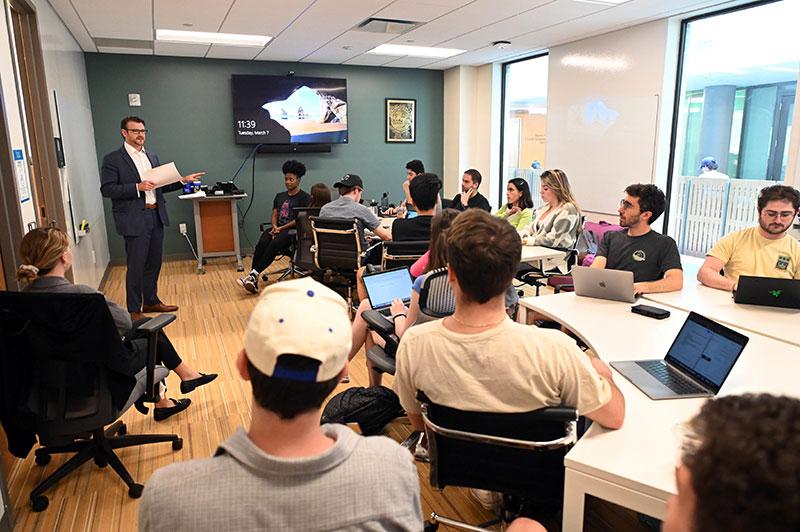New minor in Entrepreneurial Business launched

With interest in entrepreneurship growing among students, Tulane University’s A. B. Freeman School of Business has announced the launch of a new program to introduce undergraduates to the fundamentals of business creation.
The Entrepreneurial Business minor is an 18-credit-hour program designed to provide students with a firm foundation in the essentials of entrepreneurship. Intended to complement the student’s major field of study, the program explores the entrepreneurial mindset and method and investigates resources available to entrepreneurs and early-stage ventures. Additional topics covered include venture capital and private equity, new product development, management of technology, and social entrepreneurship.
The minor is currently open to business students only, but plans are to make it available to students from across the university in the near future.
“Entrepreneurship studies have become an integral component of undergraduate business education, providing students across disciplines with critical skills they can use to advance their professional careers,” said Paulo Goes, dean of the Freeman School. “Meeting the growing demand for undergraduate entrepreneurship education was a key goal of our strategic plan, and I’m pleased to say that this new program fulfills that objective.”
“The Freeman School has a vibrant ecosystem surrounding entrepreneurial education, but the resources and expertise to support that ecosystem has often been focused on the graduate level and on community outreach,” added Cameron Verhaal, assistant professor of management and chair of the minor’s curriculum committee. “This program focuses those resources squarely on the undergraduate level, providing students with the knowledge and skills they need to start and run successful companies.”
The curriculum is divided into three sections. The first, comprising core requirements, consists of two introductory courses: Fundamentals of Entrepreneurship and Financial Management. The second section consists of three electives drawn from courses including New Product Development; Venture Capital and Private Equity; Management of Technology and Innovation; Environment, Society and Capitalism; and Social Venturing for a Sustainable Future. More electives are expected to be added in the future, including courses cross listed with the Taylor Center for Social Innovation and Design Thinking and the School of Science and Engineering.
The final section of the curriculum focuses on entrepreneurial experiential learning. Courses currently satisfying this requirement include Management of New Ventures and Venture Accelerator 2, but additional courses — such as a practicum focusing on social entrepreneurship — will be added as they are developed.
“There’s a growing entrepreneurial culture in New Orleans, and we’re excited to tap into that with this program,” said Brian Bergman, assistant professor of management and a member of the curriculum committee. “Tulane alumni in particular make up a big part of the city’s startup community, so we hope to engage as many of those entrepreneurs as we can to serve as mentors and provide opportunities for experiential learning.”
To learn more about the entrepreneurial business minor program, visit https://freeman.tulane.edu/undergraduate/bsm-minors/entrepreneurial-business
Interested in advancing your education and/or career? Learn more about Freeman’s wide range of graduate and undergraduate programs. Find the right program for you.
Other Related Articles
- NOLA.com: Louisiana venture capital firms, once an afterthought, are big funders of local startups now
- Forbes: Your Pitch Deck Doesn’t Close the Deal - Your Power in the Room Does
- New Orleans startups bet on AI as Tulane expands its survey statewide in 2026
- Lepage Center honors graduating fellows
- Newsweek: Jeff Bezos May Sell up to 25M Amazon Shares
- Business Insider: Trump blasting Amazon over tariff transparency is a warning sign for US retailers
- AP News: Amazon is not planning to break out tariff costs online as White House attacks potential move
- Biotech startup breaks through at Pitch Friday
